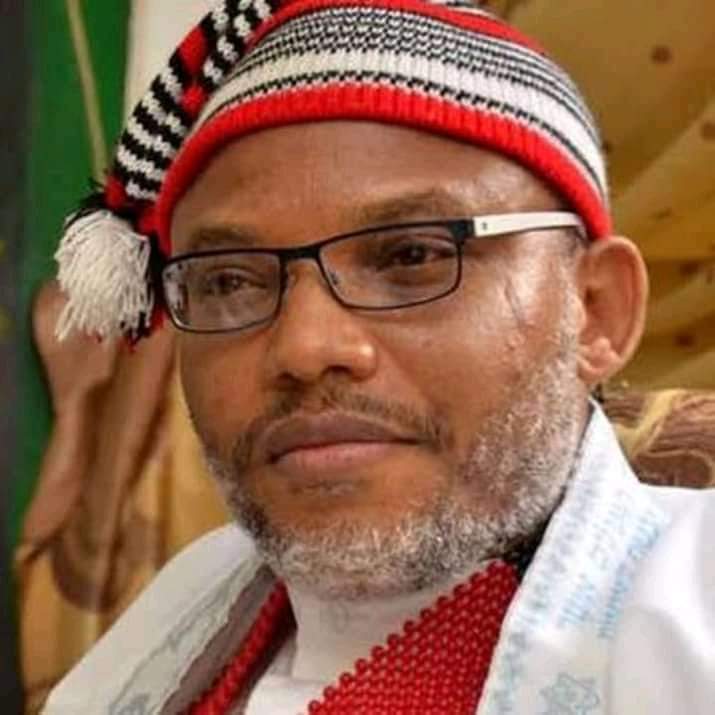Nnamdi Kanu: FG, Nigerian Court Okays Extraordinary Rendition.
The Federal High Court in Abuja, on Friday, validated last year’s extraordinary rendition and repatriation of the leader of Indigenous People of Biafra (IPOB), Nnamdi Kanu, from Kenya by the Nigerian government.
The judge, Binta Nyako, dismissed Mr Kanu’s claim that the federal government illegally repatriated him from Kenya to Nigeria without following a formal extradition procedure.
In her ruling, Mrs Nyako held that his repatriation to Nigeria could not be said to be illegal when there was a “surviving bench warrant” for the IPOB leader’s arrest.
The judge had, in March 2019, ordered Mr Kanu’s arrest after adjudging him to have jumped bail bringing his trial on charges of treasonable felony to a halt.
Mrs Nyako held that the IPOB leader’s arrest in Kenya and repatriation to Nigeria were in compliance with her order in 2018 for his arrest to face trial.
Extraordinary rendition is a state-sponsored “forcible abduction in another jurisdiction and transfer to a third state” which is a big international crime but Nigerian Government and their court are trying to paint ‘white’ ‘black’ with the laughable reason the judge gave.
The Nigeria Government through the Minister of Information and culture, Lai Mohammed makes it look like Nigeria is currently holding the world power, and that is why they invaded Kenya and abducted Nnamdi kanu, even with Statement from Kenya exonerating themselves over the arrest of Nnamdi kanu in their country.
What Nigeria did in the case of Kanu, even America and Russia cannot try it and go scot free.
That is the beauty of power from Nigeria now becoming the world power, even with Kanu being a British citizen.
In a separate ruling on Mr Kanu’s preliminary objection challenging the 15 amended charges filed against him, Mrs Nyako struck out eight of them which bordered on treasonable felony and terrorism.
She ruled that the eight charges had not established any tangible offence against Mr Kanu.
The judge dismissed the defence team’s objection over the court’s jurisdiction to entertain the suit.
The court ordered Mr Kanu’s arrest in March 2019 after he ran for his life when Nigeria military invaded his home town in Afaraukwu.
The arrest order came months after Mr Kanu fled the country in the wake of the invasion of his home by the military in Afara-Ukwu, near Umuahia, Abia State, in September 2017.
Mr Kanu’s disappearance stalled his trial which he was jointly undergoing along with his co-defendants.
With the development, the judge, on March 28, 2018, severed his trial from that of other co-defendants to stop further delay in the others’ case.
Mr Kanu, a citizen of both Nigerian and Britain, was believed to have moved to Israel and later to the United Kingdom after leaving Nigeria.
Without any public hint of the government trailing him, the Attorney-General of the Federation, Abubakar Malami, surprisingly announced in June 2021, that the freedom fighter had been “intercepted” and brought back to Nigeria.
While Mr Malami kept mum on where Mr Kanu was arrested and the circumstances of his repatriation to Nigeria, the IPOB leader’s family members and lawyers raged at what they said was his abduction from Kenya.
The government, after bringing the IPOB leader back to Nigeria, amended the existing treasonable felony charges against him to add terrorism allegations raising the number of counts to 15.
Mr Kanu pleaded not guilty to the charges during his re-arraignment. He also filed a preliminary application challenging the validity of the charges and a separate action challenging what he said was his illegal repatriation by the federal government. The IPOB leader has a pending N50billion action against the alleged illegal repatriation, but ruling has yet to be delivered on it.
Lawyers’ arguments before ruling
At the hearing of Mr Kanu’s applications in February, his lead counsel, Mike Ozekhome, a Senior Advocate of Nigeria (SAN), argued that the 15-count amended charge was invalid.
“The entire charges do not disclose any prima facie case against the defendant (Mr Kanu),” the defence lawyer told the court.
Mr Ozekhome argued that “the defendant was unlawfully and brutally extraordinarily renditioned from Kenya,” an action he said breached the African Charter on Peoples Rights.
Challenging the court’s jurisdiction to entertain the criminal case, the lawyer contended that the charges wrongly conferred “a global jurisdiction on the court” by not indicating the locations where the alleged the offences were committed.
“A charge must disclose the specific location where an alleged crime was committed,” Mr Ozekhome said.
He further told the court the “prosecution is still using the proof of evidence it tendered at the beginning of the trial in 2015” despite the fact that most of the earlier charges had been dismissed.
Dez Mayorz Report.
